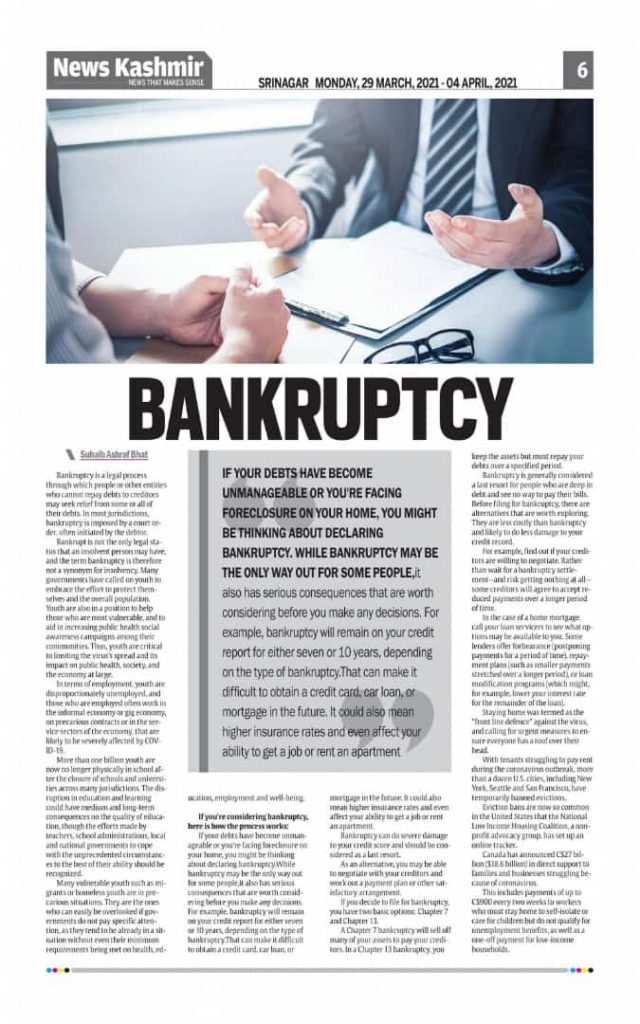Bankruptcy
Suhaib Ashraf Bhat
Bankruptcy is a legal process through which people or other entities who cannot repay debts to creditors may seek relief from some or all of their debts. In most jurisdictions, bankruptcy is imposed by a court order. often initiated by the debtor.Bankrupt is not the only legal status that an insolvent person may have, and the term bankruptcy is therefore not a synonym for insolvency. Many governments have called on youth to embrace the effort to protect themselves and the overall population. Youth are also in a position to help those who are most vulnerable, and to aid in increasing public health social awareness campaigns among their communities. Thus, youth are critical to limiting the virus’s spread and its impact on public health, society, and the economy at large.In terms of employment, youth are disproportionately unemployed, and those who are employed often work in the informal economy or gig economy, on precarious contracts or in the service sectors of the economy, that are likely to be severely affected by COVID-19.More than one billion youth are now no longer physically in school after the closure of schools and universities across many jurisdictions. The disruption in education and learning could have medium and long-term consequences on the quality of education, though the efforts made by teachers, school administrations, local and national governments to cope with the unprecedented circumstances to the best of their ability should be recognized.Many vulnerable youth such as migrants or homeless youth are in precarious situations. They are the ones who can easily be overlooked if governments do not pay specific attention, as they tend to be already in a situation without even their minimum requirements being met on health, education, employment and well-being.If you’re considering bankruptcy, here is how the process works:
If your debts have become unmanageable or you’re facing foreclosure on your home, you might be thinking about declaring bankruptcy.While bankruptcy may be the only way out for some people,it also has serious consequences that are worth considering before you make any decisions. For example, bankruptcy will remain on your credit report for either seven or 10 years, depending on the type of bankruptcy.That can make it difficult to obtain a credit card, car loan, or mortgage in the future. It could also mean higher insurance rates and even affect your ability to get a job or rent an apartment.Bankruptcy can do severe damage to your credit score and should be considered as a last resort.As an alternative, you may be able to negotiate with your creditors and work out a payment plan or other satisfactory arrangement.If you decide to file for bankruptcy, you have two basic options: Chapter 7 and Chapter 13.A Chapter 7 bankruptcy will sell off many of your assets to pay your creditors. In a Chapter 13 bankruptcy, you keep the assets but must repay your debts over a specified period.
Bankruptcy is generally considered a last resort for people who are deep in debt and see no way to pay their bills. Before filing for bankruptcy, there are alternatives that are worth exploring. They are less costly than bankruptcy and likely to do less damage to your credit record.For example, find out if your creditors are willing to negotiate. Rather than wait for a bankruptcy settlement—and risk getting nothing at all—some creditors will agree to accept reduced payments over a longer period of time.In the case of a home mortgage, call your loan servicers to see what options may be available to you. Some lenders offer forbearance (postponing payments for a period of time), repayment plans (such as smaller payments stretched over a longer period), or loan modification programs (which might, for example, lower your interest rate for the remainder of the loan).
Staying home was termed as the “front line defence” against the virus, and calling for urgent measures to ensure everyone has a roof over their head.With tenants struggling to pay rent during the coronavirus outbreak, more than a dozen U.S. cities, including New York, Seattle and San Francisco, have temporarily banned evictions.Eviction bans are now so common in the United States that the National Low Income Housing Coalition, a non-profit advocacy group, has set up an online tracker.Canada has announced C$27 billion ($18.6 billion) in direct support to families and businesses struggling because of coronavirus.This includes payments of up to C$900 every two weeks to workers who must stay home to self-isolate or care for children but do not qualify for unemployment benefits, as well as a one-off payment for low-income households.In London, where house prices are among of the highest in the world, mortgage providers have agreed to a three-month delay in repayments for borrowers affected by coronavirus.This allows homeowners to take a break from paying all or part of a monthly mortgage repayment but will increase the total amount owed, with bigger repayments in future.Many people have called for rent freezes, including activists who interrupted a council meeting in Portland in the western U.S. state of Oregon. The mayor said their proposal was illegal.In midwestern Ohio, more than 100,000 have signed a petition calling for a freeze on rent, along with mortgage payments and bills.”Be flexible where you can,” the Residential Landlords Association advised its members in England and Wales. “Work with the tenant to repay any arrears when things return to normal.”Officials in the eastern U.S. state of Connecticut have banned utility disconnections, regardless of arrears.”People need electricity, heat and water to stay home safely right now,” said Attorney General William Tong in a statement.Germany has reintroduced an initiative allowing employees to work shorter hours but keep their jobs to soften the impact of coronavirus on the labour market and allow workers to pay essential bills.Under the initiative, first used during the 2008 financial crisis, companies can apply for state aid to cover the costs of keeping people on. More than 2 million people are expected to use the scheme.France’s housing ministry said it would open two isolation centres in Paris to house and protect more than 3,600 homeless people living in the capital who have tested positive for the virus but are not required to go to hospital.
The COVID-19 pandemic has led to a dramatic loss of human life worldwide and presents an unprecedented challenge to public health, food systems and the world of work. The economic and social disruption caused by the pandemic is devastating: tens of millions of people are at risk of falling into extreme poverty, while the number of undernourished people, currently estimated at nearly 690 million, could increase by up to 132 million.Millions of enterprises face an existential threat. Nearly half of the world’s 3.3 billion global workforce are at risk of losing their livelihoods. Informal economy workers are particularly vulnerable because the majority lack social protection and access to quality health care and have lost access to productive assets.The pandemic has been affecting the entire food system and has laid bare its fragility. Border closures, trade restrictions and confinement measures have been preventing farmers from accessing markets, including for buying inputs and selling their produce, and agricultural workers from harvesting crops, thus disrupting domestic and international food supply chains and reducing access to healthy, safe and diverse diets. The pandemic has decimated jobs and placed millions of livelihoods at risk. As breadwinners lose jobs, fall ill and die, the food security and nutrition of millions of women and men are under threat, with those in low-income countries, particularly the most marginalized populations, which include small-scale farmers and indigenous peoples, being hardest hit.Millions of agricultural workers – waged and self-employed – while feeding the world, regularly face high levels of working poverty, malnutrition and poor health, and suffer from a lack of safety and labour protection as well as other types of abuse. With low and irregular incomes and a lack of social support, many of them are spurred to continue working, often in unsafe conditions, thus exposing themselves and their families to additional risks. Further, when experiencing income losses, they may resort to negative coping strategies, such as distress sale of assets, predatory loans or child labour. Migrant agricultural workers are particularly vulnerable, because they face risks in their transport, working and living conditions and struggle to access support measures put in place by governments. Guaranteeing the safety and health of all agri-food workers – from primary producers to those involved in food processing, transport and retail, including street food vendors – as well as better incomes and protection, will be critical to saving lives and protecting public health, people’s livelihoods and food security.In the COVID-19 crisis food security, public health, and employment and labour issues, in particular workers’ health and safety, converge. Adhering to workplace safety and health practices and ensuring access to decent work and the protection of labour rights in all industries will be crucial in addressing the human dimension of the crisis. Immediate and purposeful action to save lives and livelihoods should include extending social protection towards universal health coverage and income support for those most affected. These include workers in the informal economy and in poorly protected and low-paid jobs, including youth, older workers, and migrants. Particular attention must be paid to the situation of women, who are over-represented in low-paid jobs and care roles. Different forms of support are key, including cash transfers, child allowances and healthy school meals, shelter and food relief initiatives, support for employment retention and recovery, and financial relief for businesses, including micro, small and medium-sized enterprises. In designing and implementing such measures it is essential that governments work closely with employers and workers.Countries dealing with existing humanitarian crises or emergencies are particularly exposed to the effects of COVID-19. Responding swiftly to the pandemic, while ensuring that humanitarian and recovery assistance reaches those most in need, is critical.Now is the time for global solidarity and support, especially with the most vulnerable in our societies, particularly in the emerging and developing world. Only together can we overcome the intertwined health and social and economic impacts of the pandemic and prevent its escalation into a protracted humanitarian and food security catastrophe, with the potential loss of already achieved development gains.We must recognize this opportunity to build back better, as noted in the policy brief issued by the United Nations Secretary-General. We are committed to pooling our expertise and experience to support countries in their crisis response measures and efforts to achieve the Sustainable Development Goals. We need to develop long-term sustainable strategies to address the challenges facing the health and agri-food sectors. Priority should be given to addressing underlying food security and malnutrition challenges, tackling rural poverty, in particular through more and better jobs in the rural economy, extending social protection to all, facilitating safe migration pathways and promoting the formalization of the informal economy.
We must rethink and tackle this situation with ambition and urgency. Only then can we protect the health, livelihoods, food security and nutrition of all people, and ensure that our ‘new normal’ is a better one.




